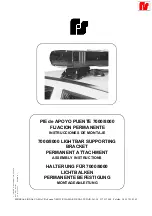
INTRODUCTION
PRELIMINAR STUDIES AND CONSIDERATIONS
MAINTENANCE AND DAMAGE PREVENTION
WORK ON BASIC VEHICLE
MOUNTING AND CONSTRUCTION
POWER TAKE-OFF
ELECTRIC AND ELECTRONIC SYSTEMS
APPENDIX
V1.0, February 2015
Body Builder Manual Part II, Specific Book LCV
107
Disc brakes:
Preventions
- After the modifications have been made to the brake system, it must be
checked to verify that it operates properly. The new installation should also be
approved by a technical inspection centre for this purpose. Otherwise, the cer
-
tificate of the vehicle would be lost.
- The hydraulic lines must be protected during welding operations, and removed
if necessary.
- Thoroughly clean the pipes before assembly.
- The pipes must be protected against the acid from the batteries. The pipes
should be redirected through other routing. If this is unavoidable, they have to
be protected with a coating.
- The Body BuiIder should verify that the straps and brackets are properly
installed, since if any of them is loose, vibration and friction can occur, which
might cause system failures.
- The homogeneity of the braking system must be checked.
- After each intervention in the brake system, carefully carry out an air purge.
Do not reuse the fluid expelled by the hydraulic circuit during the purging oper
-
ation.
WARNING
The cooling of the disc brakes must not be impaired by attaching spoilers or any
kind of cover. The overheating of brake system would impair braking ability, which
could cause damage to the vehicle tyres. In this case, the driver could lose control
of the vehicle and cause a serious accident.
CAUTION
The disc brakes must have constant and proper maintenance to prevent deforma
-
tion and failure of the system. In no circumstances must modifications be made to
the brake components (e.g. brake calipers or brake disks) or to the sensors.
CAUTION
The brakes must have a constant and proper maintenance to prevent deformation
and failure of the system. The brake fluid should be changed every two years.
NOTICE
- The accident prevention regulations and laws and regulations of each country
should be always respected.
- For more information about maintenance and damage prevention:
See General Book, chapter 4 "Maintenance and damage preventions"
















































